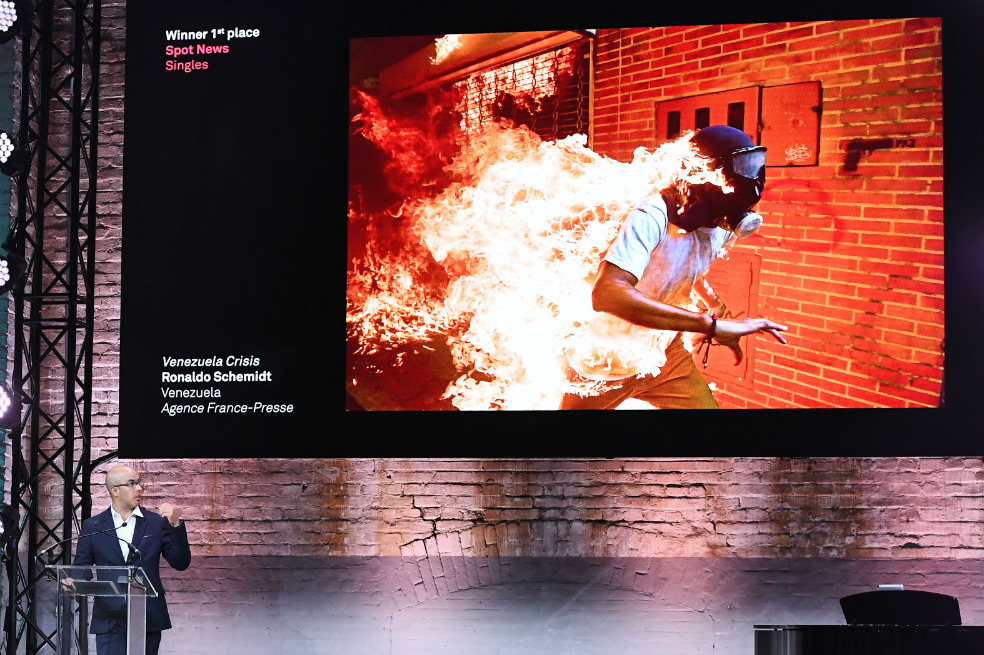Inflation On, Production Off
Your daily briefing for Friday, April 13, 2018. Translated by Javier Liendo.


Photo: Diario Contraste
Venezuela’s oil output dropped once more in March to 1.5 million barrels per day (bpd), 4.85% less than in February, according to the monthly report of the Organization of the Petroleum Exporting Countries, evidencing the largest monthly oil output drop between the 14 OPEC members and continuing the decline recorded in recent months. In March, PDVSA stopped producing 77,000 bpd, while secondary sources mark 55,300 bpd, with a monthly output of 1.4 million bpd. Compared to August 2017, Venezuelan production plummeted by over 28%, with the lowest pumping level in three decades, not including the figures from the oil strike in 2002.
In Econanalítica’s forum held yesterday morning, economist Alejandro Grisanti said that our current output is still possible “thanks to the investment of joint ventures because if it were solely for PDVSA, we’d be producing 500,000 bpd at most,” adding that in 2018, we’ll stop perceiving $30 billion for the 1.3 million bpd that we’ve stopped producing under Nicolás’ government.
Meanwhile, OPEC and its oil-producing allies are considering discussing in their June meeting the extension of the agreement of oil supply cuts in 2019, according to a statement by OPEC general secretary Mohammad Barkindo.
And so, the dollar
Imposed prosecutor general Tarek William Saab announced the arrest of Carlos Eduardo Marrón Colmenares, owner of the website Dólar Pro, whom he labeled a “financial terrorist.” According to Saab, the website’s goal was to bankrupt the country “through the illegal practice of replacing the figures issued by the Venezuelan State on dollars,” currently at Bs. 49,000, based on the latest Dicom auction. Agents of the Directorate of Military Counterintelligence arrested Marrón Colmenares and he’ll be presented before Control Court N° 3 for the crimes of disseminating false information about the exchange rate, money laundering and criminal association.
Aside from this, the average price of the black market dollar reached Bs. 560,000 this Thursday; a matter also discussed in the Ecoanalítica forum, about which economist Astrúbal Oliveros said that, by the end of 2018, if there’s no change in economic policies, the black market dollar’s price might be 85,000 sovereign bolívares, in other words, 85 millions of the current bolívares.
Tibisay’s prohibitions
National Electoral Council chairwoman Tibisay Lucena announced the rules for electoral propaganda on the media, which are actually restrictions. Any propaganda discouraging people from voting is forbidden, along with the use of symbols identifying a political party without their consent and any promos that might harm the mental health of citizens (such as the predictions for end-of-year inflation, estimated by economist Pedro Palma at 160,000%). Lucena said that the guarantees for May 20 aren’t new and that they’re broadened by the agreements signed in the Dominican Republic (?). She urged media outlets to perform a balanced coverage of the election (like VTV?) and notified that the voting stations that were arbitrarily relocated in previous elections as punishment for dissidents, have been restored. She said that the UN won’t come, but don’t worry, our observers will be the Caribbean Community, the African Union, Parlasur and Europe’s chief diplomat Federica Mogherini, who was invited via Twitter by Nicolás, so formal! According to Lucena, presidential candidates will have four minutes daily on TV and three minutes on radio stations, except Nicolás, who revealed part of his government plan yesterday while opening a desalination plant in Margarita. It was funny that Tibisay claimed that the requirement of the carnet de la patria to vote is a myth.
The trial that won’t be
National Assembly Speaker Omar Barboza announced that he received the request of the justices of the Supreme Tribunal in exile to authorize Nicolás’ trial, so the matter will be discussed next Tuesday 17.
Comunicado de la directiva de la Asamblea Nacional. pic.twitter.com/kME3v10iGH
— Omar Barboza (@OmarBarbozaDip) April 12, 2018
The Parliament’s board agreed on a proposal for a high-level Committee, composed by the leaders of each political fraction, to present in a reasonable period a report to help establish a final decision. Barboza emphasized that this is an unprecedented case and they must comply with every step “without avoiding the responsibility to reach a transparent decision before the country.”
I restate the key ideas of the Venezuelan Observatory of Justice: “In order for the justices to have authority, besides being inducted by the AN, they had to take office within the following 10 days,” a step that these justices didn’t fulfill; the Constitution establishes the principle of territoriality (they have to be in the country) and, since Nicolás is the president in office, he has immunity, except for crimes against humanity, which isn’t the case. The decisions of the TSJ in exile aren’t mandatory for Venezuela.
Abroad
- OAS chief Luis Almagro spoke yesterday about Venezuela’s need for greater international pressure to harden sanctions and with them, open a space for negotiation “to allow a democratic transition.”
- Foreign Minister Jorge Arreaza cautioned yesterday about new attacks against Venezuela, repeated the prop of “America’s guerrerista diplomacy,” which would include oil embargos, all of this to reach the epic: “No sanction, no attack, no embargo will stop a country like Venezuela.”
- Javier Carrillo, National Immigration Director of Panama, said that his country will grant special measures to travellers that might be left stranded starting April 25, when the flight suspension for Venezuelan airlines comes into effect.
- U.S. State Secretary John Sullivan met yesterday in Lima with Cuban and Venezuelan activists, and expressed his disagreement with the non-democratic transition that will take place next week in Cuba, when president Raúl Castro gives up power.
- Amnesty International (AI) published an open letter addressing heads of State that will attend the 8th Summit of the Americas, restating the human rights violations in the region and urging nations to issue a final statement promising to protect these rights. AI denounces that Venezuela “is experiencing the worst human rights crisis in its history.”
- Yesterday, the Foundation for Press Freedom (FLIP) gave Colombian Vice-President Óscar Naranjo some photographs allegedly showing the bodies of the three kidnapped Ecuadorians from newspaper El Comercio. The sudden departure of President Lenín Moreno, cancelling his attendance to the Summit of the Americas for this crisis, presents the theory that these journalists are dead, but his Interior Minister César Navas said that the first investigations about the photographs “aren’t conclusive” and that “they’ll continue investigating,” inspiring the anger of the journalists present, who even demanded Navas’ resignation.
…
Venezuelan photographer Ronaldo Schemidt (@rschemidt on Twitter) immortalized a instant from the 2017 protests, when student Víctor Salazar burned like a torch.
The image was awarded the prize for Best Picture of the Year in the prestigious contest World Press Photo, where 4,500 photographers from 125 countries participated.
Schemidt’s countryman Juan Barreto (@jbarreto1974) won 3rd place in the Stories category.
And since we’re talking about pictures, go find the beauty that shows the cunaguaro (Leopardo Pardalis) that was born last night in the Caricuao zoo.
Caracas Chronicles is 100% reader-supported.
We’ve been able to hang on for 22 years in one of the craziest media landscapes in the world. We’ve seen different media outlets in Venezuela (and abroad) closing shop, something we’re looking to avoid at all costs. Your collaboration goes a long way in helping us weather the storm.
Donate






